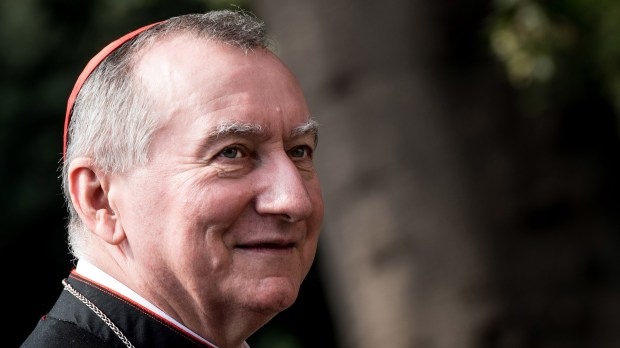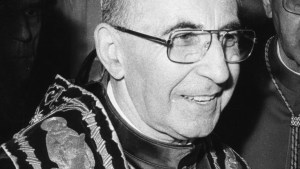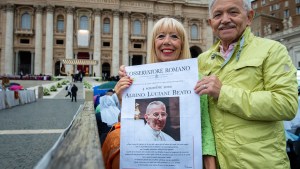Lenten Campaign 2025
This content is free of charge, as are all our articles.
Support us with a donation that is tax-deductible and enable us to continue to reach millions of readers.
On September 4, John Paul I, the pope who reigned for only 33 days, was beatified in Rome by Pope Francis. Cardinal Pietro Parolin, the secretary of state of Pope Francis, is also President of the John Paul I Vatican Foundation.
He spoke with I.MEDIA, explaining why “the importance of John Paul I in the history of the Church is inversely proportional to the time he spent as head of the Church.”
On September 2, John Paul I was beatified in Rome by Pope Francis. You were 23 years old on August 26, 1978, the day of the election of he who was then the patriarch of Venice. Do you remember that day? If so, how did you receive that news?
Cardinal Parolin: Yes, I remember that day quite distinctly. I was still a deacon. It was my last year of theology at the seminary in Vicenza, but I was in Reggio Emilia during the summer for a psychology course. That Saturday afternoon, August 26, we had gone to the diaconal ordination of a friend, also in Reggio Emilia. When we came out of the church, the news spread that the pope had been elected. And soon after, we knew the name: the cardinal patriarch of Venice.
I would say it was a great surprise, especially the speed of the election. He was elected in a very short time, in less than 24 hours, contrary to press predictions of a long, hard-fought conclave. And he had been elected, as it was later learned, with a great convergence [of votes].
As for the figure of Luciani, although he was from the region as patriarch of Venice and metropolitan of the Veneto region, I didn’t know him very well. I’d mostly just read his book Illustrissimi. In fact, I had no elements to make judgments about his person. We were still seminarians, so we had not yet entered into Vatican affairs!
So you learned more about him later?
Cardinal Parolin: Yes, it was later. Then, his event, his sudden death after 33 days of pontificate also stimulated a little bit my interest in him. And then, the way he presented himself in those 33 days, the style with which he had started his pontificate, made him appreciated all over the world, and of course aroused this interest in going deeper into this figure.
… the way he presented himself in those 33 days, the style with which he had started his pontificate, made him appreciated all over the world.
You share a common origin with John Paul I: Veneto, the great region of Italy marked by the presence of Venice but also by that of the Alps, where Albino Luciani came from. What place does the Catholic Church hold in that singular region of Italy which has given the Church so many great personalities and saints?
Cardinal Parolin: I think that things have changed profoundly in recent decades. The process of secularization that affects the entire Church somewhat, the whole world, and especially the Western world, has been felt very heavily, very massively, even in our region. It was deeply Catholic, a region where religion was not experienced as something superimposed on life but was intimately part of life, where it was a higher expression of life itself. And this was manifested especially in great religious practice, in the fact that a very high percentage of our people attended Mass, the sacraments, other liturgical celebrations… And especially at the level of vocations. In my seminary in the 1960s, there were 600 seminarians in fact.
And then a great missionary aspect in the numerous Catholic works: This was also another characteristic of the Church’s presence in the region, very much connected to social issues, especially in times of poverty. The Church was really a factor of human promotion, linked to the figures of the parish priests who had initiated great works of solidarity, such as cooperatives where people got together, etc.
Now there certainly still remains a presence of the Church, but no longer those characteristics that used to define it, although it is true that some values, such as volunteerism, I believe derive precisely from those values that the Church was able to inculcate, and which are present in the environment of Veneto.
Albino Luciani spent most of his ministry in Veneto. He was first a priest in his home diocese of Belluno, then bishop of Vittorio Veneto (1958-1969) and finally patriarch of Venice (1969-1978). What memory did he leave in his native region?
Cardinal Parolin: I believe that he left a living memory in the region of Veneto. In Belluno, where he was ordained and exercised his priesthood, there still live priests who had him as a professor in the seminary. And there they all remember him precisely for his clarity in exposition, this gift of clarity, the freshness of his preaching, for example… He had a special gift for speaking, for making himself understood. They also remember his great attention to catechesis. This was always one of Luciani’s characteristics. Lastly, they remember the period when he was vicar general, so also the firmness with which he carried out his role. Then there are still some people, quite old, who are almost crazy about him, who remember him with great emotion.
He had a special gift for speaking, for making himself understood …
How is he remembered as a bishop?
Cardinal Parolin: His appointment in Vittorio Veneto coincided with the first steps of the Second Vatican Council, and thus its gradual implementation. In Venice, I think it was the hardest period for him, where he experienced many tensions. Those were the years of contestation. So [he had to deal with] the difficulty of implementing the Council in the face of the many expressions of contestation which were arising then. I think the most beautiful picture, though, was given by the current Patriarch of Venice when he says that it is mainly humble people who remember Pope Luciani. He was very close to the people.
… it is mainly humble people who remember Pope Luciani. He was very close to the people.



